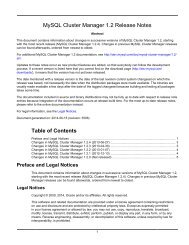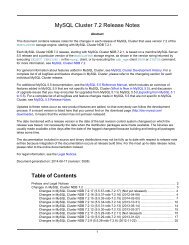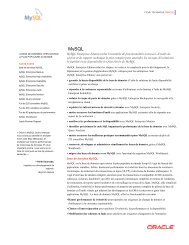MySQL 5.7 Release Notes - Download - MySQL
MySQL 5.7 Release Notes - Download - MySQL
MySQL 5.7 Release Notes - Download - MySQL
You also want an ePaper? Increase the reach of your titles
YUMPU automatically turns print PDFs into web optimized ePapers that Google loves.
<strong>MySQL</strong> <strong>5.7</strong> <strong>Release</strong> <strong>Notes</strong>Changes in <strong>MySQL</strong> <strong>5.7</strong>.4 (2014-03-31, Milestone 14)In MemoriamNoteThis is a milestone release, for use at your own risk. Significant developmentchanges take place in milestone releases and you may encounter compatibilityissues, such as data format changes that require attention in addition to theusual procedure of running mysql_upgrade. For example, you may find itnecessary to dump your data with mysqldump before the upgrade and reload itafterward.This release is dedicated to the memory of two young engineers of the <strong>MySQL</strong> Engineering family,Astha and Akhila, whom we lost while they were in their early twenties. This is a small remembranceand a way to recognize your contribution to the <strong>5.7</strong> release. You will be missed.Performance Schema <strong>Notes</strong>• The Performance Schema now instruments prepared statements (for both the binary and textprotocols):• Information about prepared statements is available in the prepared_statements_instancestable. This table enables inspection of prepared statements used in the server and providesaggregated statistics about them.• The performance_schema_max_prepared_statements_instances system variablecontrols the size of the table.• The Performance_schema_prepared_statements_lost status variable indicates how manyprepared statements could not be insrumented.For more information, see The prepared_statements_instances Table.If you upgrade to this release of <strong>MySQL</strong> from an earlier version, you must run mysql_upgrade (andrestart the server) to incorporate these changes into the performance_schema database.Security <strong>Notes</strong>• Incompatible Change: <strong>MySQL</strong> deployments installed using RPM packages now are secure bydefault. The following changes have been implemented as the default deployment characteristics:• The installation process creates only a single root account, 'root'@'localhost',automatically generates a random password for this account, and marks the password expired.The <strong>MySQL</strong> administrator must connect as root using the random password and use SETPASSWORD to select a new password. (The random password is found in the .mysql_secret filein the home directory of the effective user running the script.)• Installation creates no anonymous-user accounts.• Installation creates no test database.Those changes are implemented by modifying the default mode of operation formysql_install_db, which is invoked automatically during RPM installation operations. Therefore,the changes also affect non-RPM installation methods for which you invoke mysql_install_dbmanually.Because mysql_install_db deployment now is secure by default, the --random-passwordsoption is unnecessary and has been removed. It has been replaced by the --skip-randompasswordsoption. You can use this option to explicitly produce a deployment that is not secure bydefault:15
















